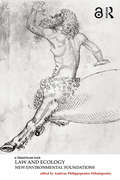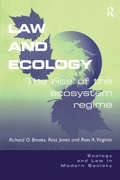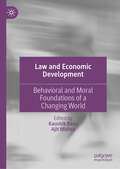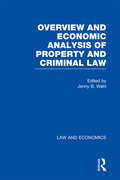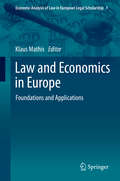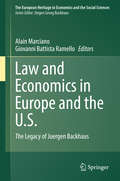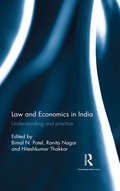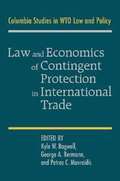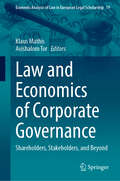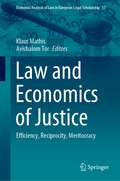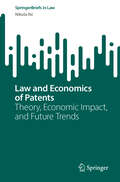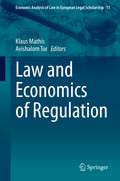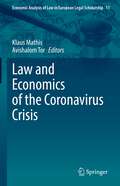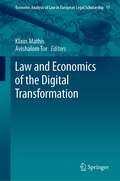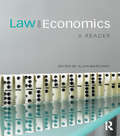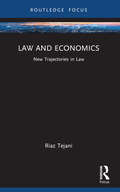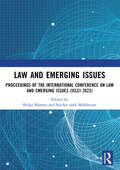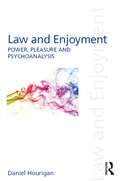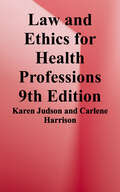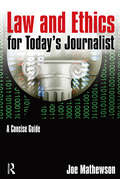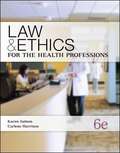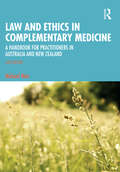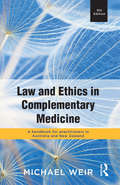- Table View
- List View
Law and Ecology: New Environmental Foundations (Law, Justice and Ecology)
by Andreas Philippopoulos-MihalopoulosLaw and Ecology: New Environmental Foundations contains a series of theoretical and applied perspectives on the connection between law and ecology, which together offer a radical and socially responsive foundation for environmental law. While its legal corpus grows daily, environmental law has not enjoyed the kind of jurisprudential underpinning generally found in other branches of law. This book forges a new ecological jurisprudential foundation for environmental law – where ‘ecological' is understood both in the narrow sense of a more ecosystemic perspective on law, and in the broad sense of critical self-reflection of the mechanisms of environmental law as they operate in a context where boundaries between the human and the non-human are collapsing, and where the traditional distinction between ecocentrism and anthropocentrism is recast. Addressing current debates, including the intellectual property of bioresources; the protection of biodiversity in view of tribal land demands; the ethics of genetically modified organisms; the redefinition of the 'human' through feminist and technological research; the spatial/geographical boundaries of environmental jurisdiction; and the postcolonial geographies of pollution – Law and Ecology redefines the way environmental law is perceived, theorised and applied. It also constitutes a radical challenge to the traditionally human-centred frameworks and concerns of legal theory.
Law and Ecology: The Rise of the Ecosystem Regime (Ecology and Law in Modern Society)
by Ross Jones Richard O. BrooksIn 1970 Earth Day was first celebrated marking the dawn of worldwide environmental consciousness and the passing of many environmental laws. In part, these events were the result of the maturing of the science of ecology which recognized the interdependence of the web and cycles of nature. This volume explores the relationship between ecology and environmental law, beginning with a description of the two very different disciplines. This description is followed by a history of their episodic interactions: the early period of origin, the mid-century formative period from 1950 to 1970, the initial serious period of interaction after Earth Day in 1970 and the testing of the relationship during the next two decades. Utilizing a number of case studies, examinations of the key 'linkage persons', legal instruments and the migration of ecological concepts and frameworks, this book analyzes the final flowering of an ecosystem regime which embraces the connections between the two disciplines of ecology and environmental law. Concluding with an inventory of the problems posed by the relationship between the two disciplines and an agenda for future research, this clearly structured, comprehensive and stringent book is an essential resource for all serious scholars and students of ecology and environmental law.
Law and Economic Development: Behavioral and Moral Foundations of a Changing World
by Kaushik Basu Ajit MishraThis book is a major stocktaking of law and economics in the context of developing and emerging economies, and in the light of the dramatic changes in the global economy that we have witnessed in recent years. The rise of artificial intelligence, digital technology, and mega platforms that collect data and facilitate trade is changing the landscape of economics. Rapid globalization has created new challenges for law and regulation, since increasingly contentious cases arise which span multiple countries and several legal jurisdictions. All these changes are giving rise to new problems in developing countries where many people lead precarious lives anyway, healthcare is minimal, and corruption widespread. Alongside these global developments, the discipline of law and economics is also undergoing profound changes, making us re-think some of the founding assumptions of the subject.
Law and Economics (Law And Economics Ser. #1)
by Jenny B. WahlFirst Published in 1999. Routledge is an imprint of Taylor & Francis, an informa company.
Law and Economics in Europe
by Klaus MathisThis anthology illustrates how law and economics is developing in Europe and what opportunities and problems - both in general and specific legal fields - are associated with this approach within the legal traditions of European countries. The first part illuminates the differences in the development and reception of the economic analysis of law in the American Common Law system and in the continental European Civil Law system. The second part focuses on the different ways of thinking of lawyers and economists, which clash in economic analysis of law. The third part is devoted to legal transplants, which often accompany the reception of law and economics from the United States. Finally, the fourth part focuses on the role economic analysis plays in the law of the European Union. This anthology with its 14 essays from young European legal scholars is an important milestone in establishing a European law and economics culture and tradition.
Law and Economics in Europe and the U.S.
by Alain Marciano Giovanni Battista RamelloThis volume traces the evolution of the field of law and economics from its European roots to its neoclassical "Chicagoan" period to its current identity as a more fluid, transatlantic discipline. Paying special attention to the work of German economist Juergen Backhaus, who was instrumental in the reintroduction of the European perspective to the field, this book analyzes this gradual shift in the law and economics debate and provides a state-of-the-art of the literature currently being produced by the field's most active scholars. Beginning with a discussion of the history of the field and Backhaus' role in its development, the volume provides a survey of issues central to the current debate such as legal processes in both Europe and the U. S. , constitutional political economy, regulatory law, and the ongoing evolution of the European Union. The importance of this volume is two-fold, as it firmly grounds the discipline in history while establishing a future research agenda. This book will be of use to researchers studying law and economics as well as those interested in institutional analysis.
Law and Economics in India: Understanding and practice
by Bimal N. Patel Ranita Nagar Hiteshkumar ThakkarThis is one of the first volumes that uses economic tools to analyse and evaluate law and policy in India. Applying economic theories such as incentive analysis, cost–benefit studies, and game theory, the essays in the volume negotiate contentious issues in law including property, contracts, torts, nuclear liability regime, bankruptcy law, criminal law and procedure, constitutional law, administrative law, environmental law, and family law. A radical take on commercial and socio-legal issues in India, this book will greatly interest scholars and researchers of law, political economy, and public policy.
Law and Economics in Japanese Competition Policy
by Koki AraiThis book demonstrates how economics is used in cases of competition in Japan. Competition between firms is usually the most effective way of allocating economic resources and achieving consumer and producer welfare. At the same time, a balance must be struck; firms must not be over-regulated, but neither must they be completely free to create a monopoly or oligopoly. Therefore, the role of competition policy is to maintain a balance by using the collaborative economics of industrial organization. The book uses economic analysis to evaluate case studies on Japanese anti-monopoly law, the Act Concerning Prohibition of Private Monopolization and Maintenance of Fair Trade (AMA), and enforcement in e.g. cartel cases, private monopolization cases, and merger cases. The Japan Fair Trade Commission implements a competition policy, primarily through the enforcement of the AMA, which promotes ingenuity and innovation in business by guaranteeing and enhancing fair and free competition, thereby ensuring economic vitality and consumer benefit. This book is the first authoritative and compact work on competition policy in Japan, which has a more-than-70-year history and is based on solid legal principles. In addition, the book seeks to promote law enforcement based on economic analysis, and includes studies describing the enforcement mechanisms used. It provides comprehensive yet concise information on the structure of the AMA, recent cases, and economic analysis. It also explains the circumstances regarding recent cases and analyzes how the economic policy has been applied to actual cases.
Law and Economics of Contingent Protection in International Trade
by Kyle W. Bagwell George A. Bermann Petros C. MavroidisThe book discusses the regulatory framework of contingent protection in the World Trade Organization - antidumping, countervailing duties, and safeguards - as well as an economic analysis of these instruments. The book's various chapters illuminate the basic functioning of all three.
Law and Economics of Corporate Governance: Shareholders, Stakeholders, and Beyond (Economic Analysis of Law in European Legal Scholarship #19)
by Klaus Mathis Avishalom TorThis book aims to analyse the principles and merits of CSR and ESG approaches using a law and economics perspective. The traditional law and economics view of corporate governance emphasises profit-maximisation and a shareholder-oriented approach. This perspective, famously endorsed by Milton Friedman, suggests that a business's sole social responsibility is to maximise profits within legal boundaries. Consequently, mainstream corporate governance scholarship has focused on structuring and regulating business organisations to achieve efficiency and minimise agency costs arising from diverging interests and asymmetric information among managers, shareholders, and creditors. However, recent decades have seen increased attention to the role and interests of other corporate stakeholders, such as employees, consumers, and communities. This shift includes the concept of corporate social responsibility (CSR), which addresses ethics-based issues like working conditions, human rights, fair competition, and environmental protection. While CSR has often been a form of self-regulation, regulatory schemes now support and incentivise this practice, promoting "stakeholderism" to enhance corporate reputation and profitability while ensuring social accountability. More recently, the focus on business sustainability has intensified under the banner of environmental, social, and governance (ESG) criteria. ESG considerations are now central in the corporate world, influencing ratings, investment decisions, and corporate strategies. Despite support from some scholars and institutions, critics argue that CSR and ESG may fail to benefit stakeholders and could impose high costs on businesses and the economy. Additionally, there are concerns about whether board members and managers are properly incentivised to protect stakeholder interests, as CSR and ESG can sometimes be used to avoid regulation or advance private interests.
Law and Economics of Justice: Efficiency, Reciprocity, Meritocracy (Economic Analysis of Law in European Legal Scholarship #17)
by Klaus Mathis Avishalom TorWhile previous volumes have examined specific issues and developments such as the coronavirus crisis or digital transformation from a law and economics perspective, the anniversary edition returns to the methodological and philosophical fundament of the discipline of law and economics. The present book aims to examine these foundations in general and, in particular, efficiency, reciprocity and meritocracy, and their relation to law and justice from an interdisciplinary perspective.Efficiency: Traditionally, the economic analysis of law has been guided by the goal of efficiency. Economists usually define efficiency as Pareto or Kaldor–Hicks efficiency. Any change that makes one member of society better off without anyone else being worse off is a Pareto improvement. A change is a Kaldor–Hicks improvement if the gainers value their gains more than the losers value their losses, with only hypothetical compensation required.Reciprocity: Economists have traditionally basedtheir models on the self-interest hypothesis of homo oeconomicus. In this model, an individual maximises his own utility without being altruistic or jealous. Behavioural economics challenges the self-interest hypothesis. In fact, many people deviate from purely self-interested behaviour. There are also signs that considerations of fairness and mutual benefit are important in bilateral negotiations and in the functioning of markets. Meritocracy: The concept of meritocracy refers to a system, organisation, or society in which people are selected and promoted to positions of success, power, and influence on the basis of their abilities and merits. This means that an individual is able to climb the social ladder through hard work. Moreover, meritocracy directs the most talented people into the most functionally important positions, thereby increasing a society's efficiency. However, the equalising function of meritocracy has been criticised. Rather than reducing inequality, meritocracy is seen as the cause of racial, economic and social inequality.
Law and Economics of Patents: Theory, Economic Impact, and Future Trends (SpringerBriefs in Law)
by Nikola IlićThis book provides a broader overview and law and economics analysis of the intricate relationship between legal frameworks governing patent granting and enforcement and their economic implications. Chapter 1 introduces a reader to the main principles and methodology underpinning law and economics. Through provided theoretical explanations, readers may gain insights into the law and economics of patents as a specific subdiscipline of law and economics that offers a valuable lens through which to view (patent-related) legal issues and policies. Chapter 2 adds further complexity to the law and economics of patents by describing and explaining the historical evolution of patents, patent granting procedures, and the scope of patent protection. Chapters 3 and 4 provide a more fine-grained analysis of patent law and related legal institutes. Chapter 3 explores economic justifications for patents and the trade-off between innovation and efficiency. Subsequently, it explores specific issues, such as patent race and patent thicket, and the role of patent enforcement in technology transfers and licensing. Chapter 4 embarks on a journey to quantify and illuminate the multifaceted economic impact of patents, focusing on their pivotal role in driving innovation and shaping market dynamics. Chapter 5 navigates the evolving landscape of patent law and policy and provides insights into the recent changes, persistent challenges, and emerging trends that shape the future of the patent system. It begins by examining recent shifts in patent law and policy, highlighting how legislative and judicial reforms have aimed to address issues of patent quality and the delicate balance between the use and abuse of patents. Moreover, it delves into the role of patents in shaping and protecting emerging technologies, from artificial intelligence and biotechnology to clean and sustainable energy. Concluding remarks and policy reflections follow in Chapter 6.
Law and Economics of Possession
by Yun-Chien ChangPossession is a key concept in both the common and civil law, but it has hitherto received little scrutiny. Law and Economics of Possession uses insights from economics, psychology and history to analyse possession in law, compare and contrast possession with ownership, break down the elements of possession as a fact and as a right, challenge the adage that 'possession is 9/10 of the law', examine possession as notice, explain the heuristics of possession, debunk the behavioural studies which confuse possession with ownership, explore the LightSquared dispute from the perspective of 'possession' of spectrum frequency and provide new insights to old questions such as first possession, adverse possession and property jurisdiction. The authors include leading property scholars, who examine possession laws in, among others, the USA, UK, China, Taiwan, Japan, Germany, France, Israel, the Netherlands, Spain, Portugal, Italy, Austria.
Law and Economics of Regulation (Economic Analysis of Law in European Legal Scholarship #11)
by Klaus Mathis Avishalom TorThis book explores current issues regarding the regulation of various economic sectors, theoretically and empirically, discussing both neoclassical and behavioural economics approaches to regulation. Regulation has become one of the main determinants of modern economies, and virtually every sector is subject to general laws and regulations as well as specific rules and standards. A traditional argument to justify regulatory interventions is the promotion of public interests. Fixing markets that lack competition, balancing information asymmetries, internalising externalities, mitigating systemic risks, and protecting consumers from irrational behaviour are frequently invoked to complement the invisible hand of the market with the visible hand of the state.However, regulations can lead to unintended consequences, and serve the interests of powerful private interest groups rather than the public interest and social welfare. In addition, new insights from behavioural economics question the traditional regulatory approaches, most prominently in attitudes towards consumers. Furthermore, digitalisation and technological innovation in general present new challenges in terms of both the type of regulation and the regulatory process.Part I of this book discusses various theoretical approaches to the economic analysis of regulations, while Part II looks at specific applications of the law and economics of regulation.
Law and Economics of the Coronavirus Crisis (Economic Analysis of Law in European Legal Scholarship #13)
by Klaus Mathis Avishalom TorThe coronavirus pandemic struck unexpectedly, posing unprecedented challenges around the world. At the same time, this crisis also offers a unique opportunity for reflection, research, and insight regarding this and similar global and domestic crises. There is much to be learned from analysing the effects of the crisis. It provides a chance for a fresh scholarly examination of important aspects of legal regulation, policymaking, and more. This volume pursues these questions from a broad range of Law and Economics perspectives and is divided into two parts. The first part examines the immediate impact of and responses to the coronavirus crisis, while the second explores the future possibilities that scholarly analysis of this crisis can offer. As to the immediate impact and responses, questions of compliance with regulations and safety measures, nudging and decision-making with regard to the coronavirus crisis are examined from the perspective of behavioural economics. In addition, the short- and long-term effects of various emergency policy responses on contract law are studied. Current issues and challenges like the regulation of internet platforms, excessive pricing, the right to adequate food, risk and loss allocation, as well as remote learning and examinations, which have been impacted, brought about, complicated or aggravated by the coronavirus crisis, are analysed in depth. Lastly, future possibilities in the areas of data access rights, economic instability and the balance between political-economic interests and social interests, patenting, food labels and open data are illustrated.
Law and Economics of the Digital Transformation (Economic Analysis of Law in European Legal Scholarship #15)
by Klaus Mathis Avishalom TorThis book pursues the questions from a broad range of law and economics perspectives. Digital transformation leads to economic and social change, bringing with it both opportunities and risks. This raises questions of the extent to which existent legal frameworks are still sufficient and whether there is a need for new or additional regulation in the affected areas: new demands are made on the law and jurisprudence.
Law and Economics: A Reader (New Horizons In Law And Economics Ser. #18)
by Alain MarcianoThis book brings together the most authoritative articles on Law and Economics and the interaction between the two disciplines as well as the use of economic tools to analyse legal problems. Aimed at students experiencing the subject for the first time, the selections are interlaced with a wealth of features including explanatory introductions and exercises. Key features of the reader include: - The accessibility of the material: the articles should be understandable to those with only a limited background in economics and law. - The book’s focus on the most important and basic – foundational – issues in law and economics. - An exposition of the opposition between the different legal systems that exist in the world including common law, civil law and public law. - Debates viewed from the perspective of the scholars from a range of backgrounds are presented as well as all the key figures in economics and in law. The book should prove to be an essential resource to all students studying this burgeoning field and represents an exciting introduction to one of the key disciplines which has grown up in the social sciences in recent times.
Law and Economics: New Trajectories in Law (New Trajectories in Law)
by Riaz TejaniThis book examines the contemporary significance of the Law and Economics movement. Drawing on anthropology, sociology, political economy, and ethics, the book traces the influence of lawyer-economists in developing and operationalizing key ideas – for instance human capital and structural adjustment – that have come to be grouped under the heading of ‘neoliberalism’. It then examines how these ideas are tied to global environmental harm and to wealth inequality. Largely because of such ties, sociolegal studies tends to dismiss economic thought. This book, however, forges a path between economic and sociolegal approaches. Discussing thinkers such as Foucault and Polanyi, Calabresi and Sunstein, it demonstrates both the possibilities and limitations inherent in economistic approaches to law. Bringing together disparate and sometimes conflicting literatures, the book thereby eschews disciplinary taboos in the name of a creative, sympathetic, and critical rereading of the key ideas of Law and Economics. This book will be of interest to students and researchers in sociolegal studies, anthropology, sociology, and economics.
Law and Emerging Issues: Proceedings of the International Conference on Law and Emerging Issues (ICLEI 2023)
In the ever-evolving landscape of law and governance, adaptation and innovation are key to addressing the challenges of our times. This edited volume is a testament to the ever-evolving nature of the legal field and the ongoing efforts of legal scholars and academicians to dissect, analyze, and grapple with the challenges and opportunities presented by these changes. The topics covered in this book span a wide spectrum of legal domains, reflecting the complex and rapidly changing nature of our contemporary world. From corporate governance structures to emerging challenges in the digital space, from analyzing the implications of the Social Security Code 2020 in India to understanding the legal developments surrounding unorganized migrant workers during the COVID-19 pandemic, the breadth of subjects addressed here is both impressive and vital.
Law and Enjoyment: Power, Pleasure and Psychoanalysis
by Daniel HouriganThis book advocates, and develops, a critical account of the relationship between law and the largely neglected issue of ‘enjoyment’. Taking popular culture seriously – as a lived and meaningful basis for a wider understanding of law, beyond the strictures of legal institutions and professional practices – it takes up a range of case studies from film and literature in order to consider how law is iterated through enjoyment, and how enjoyment embodies law. Drawing on psychoanalytic theory, this book addresses issues such as the forced choice to enjoy the law, the biopolitics of tyranny, the enjoyment of law’s contingency, the trauma of the law’s symbolic codification of pleasure, and the futuristic vision of law’s transgression. In so doing, it forges an important case for acknowledging and analyzing the complex relationship between power and pleasure in law – one that will be of considerable interest to legal theorists, as well as those with interests in the intersection of psychoanalytic and cultural theory.
Law and Ethics for Health Professions
by Karen Judson Carlene HarrisonThis book explains how to navigate the numerous legal and ethical issues that health care professionals face every day. Topics are based upon real-world scenarios and dilemmas from a variety of health care practitioners. In the ninth edition, material has been revised to reflect the current health care environment. <p><p>As students progress through the text, they will get the opportunity to use critical thinking skills to learn how to resolve real-life situations and theoretical scenarios and to decide how legal and ethical issues are relevant to the health care profession in which they will practice.
Law and Ethics for Today's Journalist: A Concise Guide
by Joe MathewsonLaw and Ethics for Today's Journalist offers aspiring and working journalists the practical understanding of law and ethics they must have to succeed at their craft. Instead of covering every nuance of media law for diverse communications majors, Mathewson focuses exclusively on what's relevant for journalists. Even though media law and media ethics are closely linked together in daily journalistic practice, they are usually covered in separate volumes. Mathewson brings them together in a clear and colourful way that practicing journalists will find more useful. Everything a journalist needs to know about legal protections, limitations, and risks inherent in workaday reporting is illustrated with highlights from major court opinions.Mathewson advises journalists who must often make ethical decisions on the spot with no time for the elaborate, multi-faceted analysis. The book assigns to journalists the hard decisions on ethical questions such as whether to go undercover or otherwise misrepresent themselves in order to get a big story. The ethics chapter precedes the law chapters because ethical standards should underlie a journalist's work at all times. There may be occasions when ethics and law are not parallel, thus calling for the journalist to make a personal judgment. Law and Ethics for Today's Journalist is user-friendly, written in clear, direct, understandable language on issues that really matter to a working journalist. Supplementary reading of the actual court cases is recommended and links to most cases are provided in the text. The text includes a fine (but purposely not exhaustive) bibliography listing important and useful legal cases, including instructive appellate and trial court opinions, state as well as federal.
Law and Ethics for the Health Professions (6th Edition)
by Karen Judson Carlene HarrisonLaw & Ethics for the Health Professions, sixth edition, provides an overview of the laws and ethics you should know to help you give competent, compassionate care to patients that is also within acceptable legal and ethical boundaries. The text can also serve as a guide to help you resolve the many legal and ethical questions you may reasonably expect to face as a student and, later, as a health care practitioner.
Law and Ethics in Complementary Medicine: A Handbook for Practitioners in Australia and New Zealand
by Michael WeirComprehensive, practical and reflective of the current Australian and New Zealand legislative framework and regulations, this unique textbook addresses legal and ethical issues across a broad range of traditional and complementary practices. The sixth edition of Michael Weir’s classic textbook: • explores legal and ethical issues in clinical relationships, and the role of codes of ethics; • provides practical guidelines for setting up and running a professional practice; • systematically outlines the various aspects of the law which impact on clinical practice, including legal obligations to clients, consumer legislation, complaints processes, and professional boundaries;• explains how to navigate professional indemnity insurance; • outlines the steps you need to take in setting up a professional practice from establishing a business name to dealing with employees; • discusses and provides examples of how to deal with tricky ethical issues in daily practice. This edition includes updated legislation, a review of relevant case law, recent developments in the Unregistered Practitioners’ Code of Conduct and evidence about misconduct and regulatory action, and more in-depth discussion of ethical concepts. This is an essential read for students and practitioners of complementary medicine.
Law and Ethics in Complementary Medicine: A handbook for practitioners in Australia and New Zealand
by Michael Weir'A valuable resource for those in clinical practice and students undertaking primary and secondary qualifications in the complementary medicine and therapy disciplines.' Caroline Smith, Professor, Complementary Medicine Research, National Institute of Complementary Medicine, Western Sydney UniversityComprehensive, unique and reflective of the current Australian legislative framework and AHPRA regulations, Michael Weir's Law and Ethics in Complementary Medicine remains the most widely used reference text in the field. A valuable handbook for professionals, students and researchers, the text addresses legal and ethical issues across a broad range of traditional, complementary and integrative practices.The text deals with legal and ethical issues in clinical relationships and provides practical guidelines for setting up and running a professional practice. Michael Weir systematically outlines the various aspects of the law which impact on clinical practice, including legal obligations to clients, consumer legislation and complaints processes, and professional boundaries. He explains how to navigate professional indemnity insurance, and the steps you need to take in setting up a professional practice from establishing a business name to dealing with employees. He also outlines the role of codes of ethics, and explores how to deal with tricky ethical issues in daily practice.This fifth edition is fully updated with in-depth treatment of the issue of ethical practice and professional decision making. It addresses recent changes in regulation and case law, including the development of the National Code of Conduct for Healthcare Workers and also now includes yoga and holistic counselling as modalities of complementary medicine.
